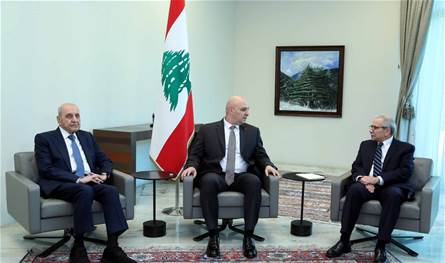Authorship consultations towards the urgency of technocratic government
January 15, 2025

Political circles supporting Nawaf Salam’s appointment look at the content of his statement from the perspective of its emulation of Lebanon’s most pressing priorities and his awareness of the nature of the challenges that will be posed to his government, such that it resembles the first post-Taif governments, which Salam allocated a very important space to in his statement. Therefore, the data reflected by these circles yesterday evening seemed inclined to the positive and expected a promising start to the process of forming the government, following the tripartite meeting that included Presidents Joseph Aoun, Nabih Berri, and Nawaf Salam in Baabda Palace, which was followed by a lengthy bilateral meeting between Aoun and Salam during which the broad topics were agreed upon to expedite the formation of the government. The government and preventing the growth of any problems that might threaten the launch of the era and the government with expected momentum internally and externally, then the traditional tour carried out by the President He appointed the former prime ministers during which he heard great encouragement and praise for the directions included in the assignment statement. But these impressions collided yesterday evening with information that was reported about Hezbollah’s tendency to boycott the authorship consultations, but circles close to it said that there is no final position yet regarding participation in the consultations, while the concerned authorities are awaiting the parliamentary positions that will be announced today and tomorrow in the non-binding parliamentary consultations that the president will conduct. Salam in the House of Representatives to crystallize what appeared to be a strong trend by Presidents Aoun and Salam towards a completely technocratic government that takes into account comprehensive parliamentary representation. As for the final position of the Shiite duo regarding participation or non-participation in the government, the matter will not crystallize quickly before the progress of the consultations that Salam will begin to conduct immediately after the consultations in the Council end, with his clear intention not to consume a long time to complete the government formation.
Informed political sources through “Al-Liwaa” stopped at the agreement between Presidents Aoun and Salam when they refused to exclude or break any component and dispelled the concerns of the Shiite component, indicating that this common reassurance is enough to arrange the situation, especially after the high-level positions of this component and there is anticipation that it will seize the situation.
These sources pointed out that the outstretched hand policy was reversed by the president-designate from Baabda Palace.
She explained that the position on not breaking anyone was expressed by the President of the Republic before the Supreme Shiite Islamic Council, noting that the President of the Republic avoided any talk about the form of government that he wanted to establish as the first government of the era and emphasized the importance of completing the formation as soon as possible so that the era could start, as he wished to For everyone to participate in it.
She considered that forming the government without any delay and obstacles was what was required.
She pointed out that the issue is not related to an inclination towards a specific government or a specific composition, but rather with the participation of all components.
As for monitoring circles, they said that the government will not be loose and that Presidents Aoun and Salam will cooperate in forming it in accordance with the constitution. Therefore, they will consult to agree on its form and there is no intention of violating the principles.
Regarding the government formula, the focus is on separating the prosecution from the ministry, and forming a government of 24 specialist ministers who do not belong to parties, and another formula of 30 ministers, including 6 political ministers.
Al-Diyar wrote: The atmosphere of both Presidents Aoun and Salam seems to be largely identical in terms of how to deal with the next stage, which is what the two insisted on conveying to those concerned, whether in their public statements, or during closed meetings and communications. It is worth paying attention to 3 points. Prominent in the speech of the President-designate, most notably:
His speech was in line with the aspirations that were clearly expressed in his oath speech, in terms of rebuilding the state, implementing international resolutions, and restoring the law to its place.
– His emphasis on his desire to deal with everyone, in his talk about “outstretched hands,” specifically to the Shiite duo, in case he believes that someone is trying to exclude him.
-The absence of any reference to the parliamentary elections file and the election law.
Al-Diyar wrote: Sources accompanying the ongoing communications intersect, stating that it is in the interest of the duo to participate in the government, especially since he has some of the strings of the game that he played with the election of the President of the Republic, which makes it impossible for any government to proceed without him, to maintain the balances within it, In order to avoid a “government crisis,” here is the main challenge facing the duo, apart from quotas, in the process of restoring its relations with its allies and “strengthening” cooperation with them within the Council of Ministers.
The sources expressed their belief that the trend of matters does not indicate that the country is heading toward a governance crisis, as a result of Hezbollah’s concern for general stability and its interest in rebuilding what was destroyed, in addition to the fact that the atmosphere of the last hours and the positions issued by the two presidents are positive and call for “reassurance,” hoping that What happened is like a summer cloud that has passed, especially since the visit of the delegation of the Supreme Islamic Shiite Council to Baabda points in this direction, where it heard clear words. From Aoun, he said, “It is not possible for one component to be broken and another not to be broken. If one component is broken, all of Lebanon will be broken.”
The circles concluded that the data available so far confirm the unified desire of all parties to participate in the new government, which is likely to consist of 24 ministers, with each bloc represented by 5 deputies by a minister, provided that they are chosen from among those with competence and specialization, by the parties and parties. Politically, what is most notable at this level is the tendency of both the President of the Republic, Joseph Aoun, and the government, Nawaf Salam, to not obtain ministerial quotas, in a precedent that will be the first since the implementation of the Constitution of the Republic. Second, presidents are accustomed to having a ministerial and parliamentary bloc.
Salam’s keenness emerged in his statement to present reconstruction as a basic priority, declaring that it is not just a promise but a commitment. He coupled this with a parallel emphasis on the full implementation of Resolution 1701 and all the provisions of the ceasefire agreement, and the imposition of the enemy’s complete withdrawal from the last occupied inch of Lebanese territory. He said that this also requires working to extend the authority of the Lebanese state over its entire territory through its own forces, as literally stated and stipulated in the Taif Agreement. He pointed out that the basis for political reforms is to work to implement the provisions of Taif that have not yet been implemented, to correct what has been implemented contrary to its letter or spirit, and to fill its gaps. This cannot be achieved without working to implement expanded administrative decentralization, and without an independent judiciary and effective security institutions. In response to some of the concerns that were raised yesterday, he said: By nature, formation, and political practice, I am not one of the people of exclusion, but rather one of the people of unity. I am not one of exclusion, but rather one of national understanding and partnership. My two hands are extended to everyone to embark together on the mission of rescue, reform and reconstruction. He addressed the youth by saying that the Lebanon for which we will work is the Lebanon that embraces you so that you can live in safety.
Prime Minister-designate Salam toured the former prime ministers and met successively with Presidents Najib Mikati, Fouad Siniora, and Tammam Salam. He is conducting non-binding parliamentary consultations today for the parliamentary blocs and tomorrow for the independent representatives in the House of Representatives building. Salam explained that he will listen to the representatives today, and when I have a vision, I will share it with the media for public opinion. We are in a new era and we want it to start quickly.
Macron and Guterres to Beirut on Friday.. France: a new space of hope for Lebanon and the Lebanese









